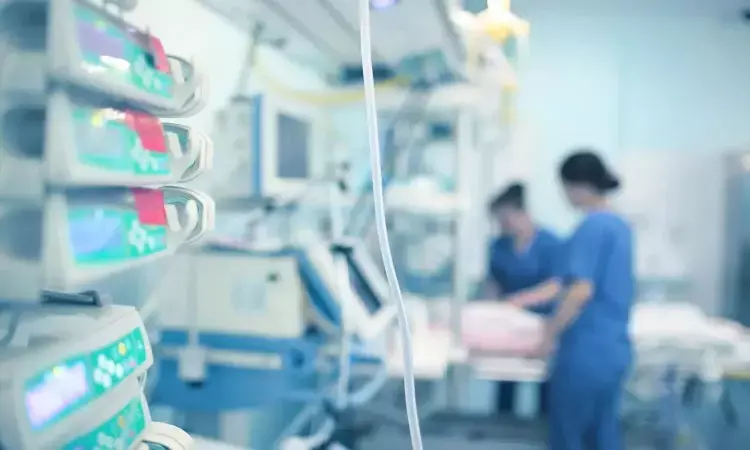- Home
- Medical news & Guidelines
- Anesthesiology
- Cardiology and CTVS
- Critical Care
- Dentistry
- Dermatology
- Diabetes and Endocrinology
- ENT
- Gastroenterology
- Medicine
- Nephrology
- Neurology
- Obstretics-Gynaecology
- Oncology
- Ophthalmology
- Orthopaedics
- Pediatrics-Neonatology
- Psychiatry
- Pulmonology
- Radiology
- Surgery
- Urology
- Laboratory Medicine
- Diet
- Nursing
- Paramedical
- Physiotherapy
- Health news
- Fact Check
- Bone Health Fact Check
- Brain Health Fact Check
- Cancer Related Fact Check
- Child Care Fact Check
- Dental and oral health fact check
- Diabetes and metabolic health fact check
- Diet and Nutrition Fact Check
- Eye and ENT Care Fact Check
- Fitness fact check
- Gut health fact check
- Heart health fact check
- Kidney health fact check
- Medical education fact check
- Men's health fact check
- Respiratory fact check
- Skin and hair care fact check
- Vaccine and Immunization fact check
- Women's health fact check
- AYUSH
- State News
- Andaman and Nicobar Islands
- Andhra Pradesh
- Arunachal Pradesh
- Assam
- Bihar
- Chandigarh
- Chattisgarh
- Dadra and Nagar Haveli
- Daman and Diu
- Delhi
- Goa
- Gujarat
- Haryana
- Himachal Pradesh
- Jammu & Kashmir
- Jharkhand
- Karnataka
- Kerala
- Ladakh
- Lakshadweep
- Madhya Pradesh
- Maharashtra
- Manipur
- Meghalaya
- Mizoram
- Nagaland
- Odisha
- Puducherry
- Punjab
- Rajasthan
- Sikkim
- Tamil Nadu
- Telangana
- Tripura
- Uttar Pradesh
- Uttrakhand
- West Bengal
- Medical Education
- Industry
Cholecystectomy associated with increased risk of developing Metabolic syndrome

Cholecystectomy associated with increased risk of developing Metabolic syndrome suggests a new study published in the Hepatobiliary Surgery and Nutrition
Cholecystectomy is a common surgical procedure to treat symptomatic gallstones; however, the long-term outcomes after cholecystectomy are unknown. Therefore, we aimed to investigate whether incident metabolic syndrome (MetS) is associated with cholecystectomy through a large, population-based, longitudinal study.
Subjects aged ≥20 years who underwent cholecystectomy from 2010 to 2014 (n=76,485) and controls (n=76,485), matched for age and sex, were identified from the Korean National Health Insurance Corporation. Cox proportional hazards analyses were performed to evaluate the association between cases and incident MetS, and hazard ratios and 95% confidence intervals (CIs) were calculated.
RESULTS
A total of 152,970 patients were included. Mean age was 52.47±12.76 years, and 50.65% of participants were male. During the follow-up period, there were 38,979 (25.48%) newly diagnosed MetS cases in the study participants. The risk of MetS in the cholecystectomy group was approximately 20% higher than that in the control group [adjusted odds ratio (OR), 1.20; 95% CI: 1.17-1.23]. In the fully adjusted models, the corresponding ORs for new-onset high waist circumference (WC), low high-density lipoprotein cholesterol (HDL-C) levels, high triglycerides (TG) levels, high blood pressure (BP), and high blood glucose levels were 1.16 (1.13-1.19), 1.19 (1.16-1.22), 1.25 (1.22-1.28), 1.27 (1.23-1.31), and 1.21 (1.18-1.24), respectively. Cholecystectomy was an independent risk factor of incident MetS, after adjusting for potential confounding factors. In the subgroup analyses, the cholecystectomy group had a higher risk of MetS than the control group in subjects without hypertension or dyslipidemia, respectively.
In this large, population-based study, cholecystectomy was associated with an increased risk of developing MetS, independent of other confounding factors. Therefore, careful monitoring of metabolic variables and long-term follow-up are required to evaluate MetS risk after cholecystectomy.
Reference:
Huh, Ji Hye, et al. "Cholecystectomy Increases the Risk of Metabolic Syndrome in the Korean Population: a Longitudinal Cohort Study." Hepatobiliary Surgery and Nutrition, vol. 12, no. 4, 2023, pp. 523-533.
Keywords:
Cholecystectomy, associated, increased, risk, developing, Metabolic syndrome, Hepatobiliary Surgery and Nutrition, Huh, Ji Hye
Dr. Shravani Dali has completed her BDS from Pravara institute of medical sciences, loni. Following which she extensively worked in the healthcare sector for 2+ years. She has been actively involved in writing blogs in field of health and wellness. Currently she is pursuing her Masters of public health-health administration from Tata institute of social sciences. She can be contacted at editorial@medicaldialogues.in.
Dr Kamal Kant Kohli-MBBS, DTCD- a chest specialist with more than 30 years of practice and a flair for writing clinical articles, Dr Kamal Kant Kohli joined Medical Dialogues as a Chief Editor of Medical News. Besides writing articles, as an editor, he proofreads and verifies all the medical content published on Medical Dialogues including those coming from journals, studies,medical conferences,guidelines etc. Email: drkohli@medicaldialogues.in. Contact no. 011-43720751


